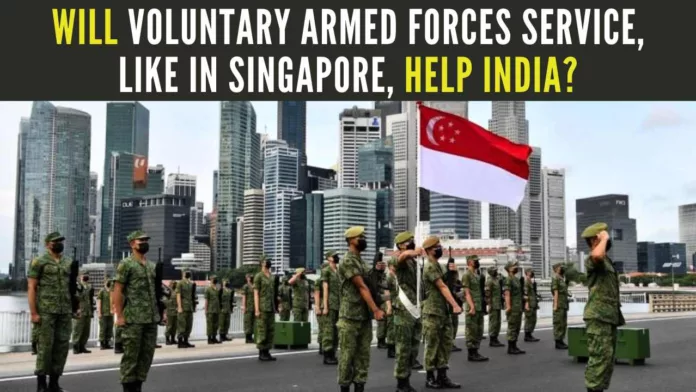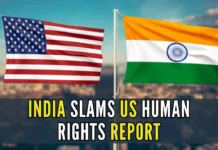
Should India consider piloting a voluntary civilian armed forces program?
What is commonly known about Singapore is its 2-year NS (National Service), that is, military conscription, a compulsory duty for every male citizen upon completion of schooling.
But what is not so well known is its voluntary scheme allowing first-gen citizens and PRs, men and women aged 18-45 who were exempt from conscription, to contribute to national defence. Many of those who undergo this program are working professionals. But they don’t have to forego their salaries either. The government compensates them for the potential loss of pay and does it seamlessly.
Singapore is one of the most peaceful countries in the world, with almost no threat from within or outside. But being a small city-state, it wants to be on guard. So it has the compulsory National Service and a voluntary scheme to complement it.
The first phase of this program is approximately 10 days long, including physical fitness and practical firearms training. It can be rigorous and not for the faint-hearted. But this program can do a whole lot of good for the participants, the three most prominent ones being:
- It makes them physically fit, and the community tries to sustain their fitness levels even after the training period.
- It makes them mentally very strong. It enhances their self-esteem so much that they can easily face many personal and professional life problems after the program.
- It makes them less flippant and more nationalistic, and realize what it takes to guard and manage the nation.
India doesn’t have the kind of bench strength need that Singapore has, as our defence and police forces are large. So why should we consider piloting such a voluntary civilian armed forces program in India?
- First, the participants will become physically and mentally fitter, and the individuals and the nation will benefit from this immensely.
- This training program will be so good that the participants will be better performers in their jobs, wherever they may be working, and will cope much better with stress and anxiety in their lives professionally and personally.
- The trainers will also be obviously drawn from the defence forces, and it will be a dress rehearsal for them to train their personnel.
- This program can also be an entry barrier for jobs in defence and police forces and even private sector jobs like security. It can also serve as a very good part of the recruitment process, not only for these jobs but also for some other jobs, so that good candidates are not missed out and inappropriate ones are not recruited. This will be a huge plus for the recruiters.
- There is a need to create a nationalistic spirit in our youth in the current socio-political atmosphere of civil disobedience at the drop of a hat in many parts of the country, esp with social media making people take governance casually.
- And should an emergency arise, we will have an ample supply of volunteers who can at least be used as defence or police service support personnel, if not better. Ukraine faced such a situation, and even untrained people had to be used, with reasonable success.
- Though the number of participants who can be covered is small, with widespread word-of-mouth communication that will happen automatically, we can make the larger society understand the importance and difficulty of guarding and protecting the nation.
- Another benefit will be that these participants will develop better self-esteem and become more employable since we have many unemployable youth. The program can even be enhanced with an employability skills training program. We can wean away at least some of the youth from the ‘Government job or nothing’ mindset.
- Well-trained and motivated youth will not entirely depend on the Government for jobs; at least some of them will identify and even create their own jobs. It will help channel youth power productively.
- Since the training will be provided by the defence services personnel during peacetime, there will be almost no cost to trainers. Since the program will be attended voluntarily with no remuneration payable to the participants, this cost will also be zero. The only costs of such a program will be the cost of program materials, food, logistics, etc, which will be nominal.
Obviously, this program can be implemented in India only for a small fraction of the youth population, but if it proves effective in the initial years, it can be increasingly extended to a larger section of the youth population over time, in lieu of many freebies/ revdis.
A one-off pilot program can be conducted, to start with.
Note:
1. Text in Blue points to additional data on the topic.
2. The views expressed here are those of the author and do not necessarily represent or reflect the views of PGurus.
PGurus is now on Telegram. Click here to join our channel and stay updated with all the latest news and views
For all the latest updates, download PGurus App.
- How BJP can get 33%+ vote share in TN - April 1, 2024
- A transparent, equitable electoral funding alternative - March 19, 2024
- How TN BJP can come to No. 1 or No. 2 in 2024 LS polls - January 11, 2024










